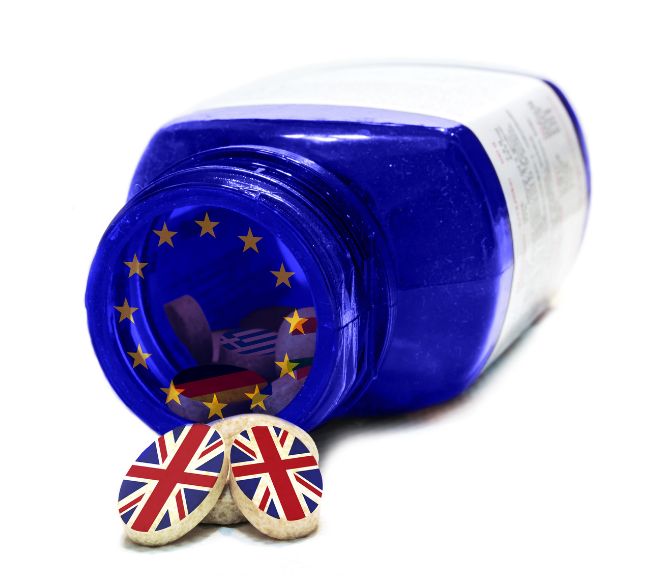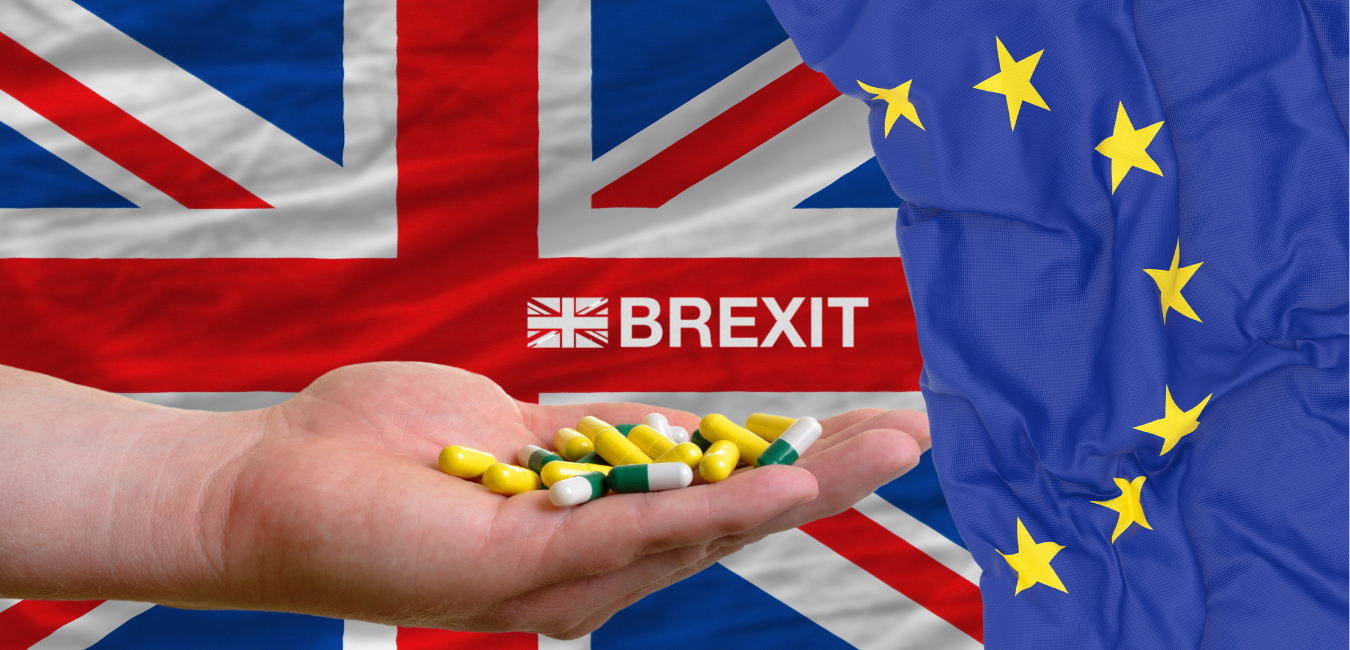Time is passing very fast, relentlessly, and while it may seem that Brexit happened only yesterday, it in fact has been a long time since the British voters passed the 2016 referendum and United Kingdom (UK) has formally left the European Union (EU). As a result, on 31 January 2020 UK became a third country to the EU. It’s been also quite a while since a transition period stated within Withdrawal Agreement, during which EU pharmaceutical law as laid out in the ‘Acquis Communautaire’ continued to be applicable to the UK, has ended (on 31 December 2020) [1].
Needless to say – Brexit itself was an event that cost entrepreneurs many sleepless nights due to the rather unpredictable course and tense negotiations between the EU and the UK. Most of people concerned, wondered if the EU and the UK would get along or not and which scenario will be implemented – “deal” or “no deal”. Ultimately, although Brexit means the exit of the entire UK from the EU, the matter isn’t that simple after all – Northern Ireland Protocol [2] needs to be taken into consideration. In short, while Northern Ireland (NI) is part of the UK, it remains under EU law in some aspects including regulatory of pharmaceutical industry such as Marketing Authorisation Holder (MAH) or batch release site localisation.
Brexit has touched practically every area of pharmaceutical industry, so describing the impact on each area would involve writing a lengthy essay. Therefore, this article will focus mainly on a selected regulatory aspects. At the beginning, let’s take a closer look on provisions of Brexit concerning MAH localisation and pharmacovigilance requirements.
MAH localisation – the original provisions
Quick regulatory background summary
For a better understanding of this article, let’s take a look at a brief summary on the UK status in Mutual Recognition Procedure / Decentralised Procedure (MRP/DCP) and central licenses. In case of MRP/DCP procedures MAH could choose the option to maintain a UK-wide marketing authorisation and retain the UK in respect of Northern Ireland (UK(NI)) as a Concerned Member State (CMS). In this case, the authorisation continued to be a UK-wide Marketing Authorisation (MA) with Northern Ireland as a CMS and Great Britain (GB) aligned with, but not part of, the MRP/DCP [3]. In case of centralised procedures all existing Centrally Authorised Products (CAPs) MAs have been automatically converted into Great Britain MAs effective from 1 January 2021 in Great Britain only (England, Wales and Scotland) and have been issued with a Great Britain Product Licence (PLGB) MA number. These Great Britain MAs are referred to as “converted EU MAs”. As a result of the implementation of the Northern Ireland Protocol, existing CAPs remained valid for marketing products in Northern Ireland [4].
Brexit, Year 2020
It should be emphasized, that just like in any other relationship breakdown, we have two confronting sides which have different requirements and needs – in case of Brexit: EU (European Commission, EMA, CMDh and national Agencies) side and UK (MHRA) side.
From the European perspective, since from the Brexit date, UK has become a ‘third country’ (joining the group of China, India, Canada and other third countries) the EU requirement was that MAH for medicinal products authorised under EU laws has to be located in the EU/EEA region [5]. Thus, at the end of the transition period, MAHs located in the United Kingdom had to have transferred its marketing authorisation to a holder located in the EU. Therefore, many pharmaceutical companies had to transfer MA holders localisation from UK to EU/EEA. A slight exception was allowed only for MAs in Northern Ireland (UK(NI)), where MAH could have been established in Northern Ireland, but not in Great Britain (UK(GB)) [6, 7].
From the UK-perspective, the marketing authorisation holder for a UK marketing authorisation must be established in the UK (Great Britain or Northern Ireland) or in the EU/EEA [8].
The question is: what in case of MRP/DCP procedures with UK-wide MA retaining UK(NI) as CMS? Where MAH can be located and where cannot be? Original guidelines tell us that for UK-wide MA (covering UK(NI) and (UK(GB)) MAH could not have been located in GB. It meant that although the MA covered whole UK, the MAH could not have been located at GB part of UK. Going forward, it meant that for medicinal products authorised in UK, by MHRA, MAH could not have been located in a large part of UK because part of UK(NI) remained to be part of MRP/DCP procedure. In order to comply with the guidelines, appropriate post-registration changes had to be submitted.

MAH localisation requirements – further changes and current update
As time has shown the guidelines and provisions from the Brexit agreement are one thing and the reality is another. Although industry had one year of transition period to adapt to post-Brexit requirements – as it turns out this time was not enough and MAHs still needed additional time.
Changes in guidelines – Brexit, year 2021 and the present time
Therefore on 25 January 2021 Commission notice [9] has been published in order to reflect the actual (on that time) progress of the industry to implement the required changes and move relevant regulatory compliance functions to Northern Ireland or the EU in respect of nationally authorised products, as required by the Protocol. The Commission Notice of 25 January 2021 provided for a grace period of one year (until end-December 2021) for maintaining batch testing and manufacturing / logistics in parts of the United Kingdom other than Northern Ireland to ensure undisrupted supply of medicines to Northern Ireland, Cyprus, Ireland and Malta. It is worth noting that the commission notice from 25 January 2021 did not cover the question of localisation of Marketing Authorisation Holder – although such an issue existed.
More time passed and at the end of year 2021 pharma industry still had not adapted to post-Brexit requirements. The main reasons observed were the too high adjustment costs relative to the small size of the Northern Irish market and the complex logistics involved, for which no viable alternative logistical hubs in Northern Ireland have been identified [10]. In order to address this situation, and with the aim of preventing shortages of medicines and ensuring a high level of public health protection, with regard to medicinal products for human use, the Commission on 17 December 2021 adopted legislative proposals amending relevant provisions of Directive 2001/83/EC, Directive 2001/20/EC and Regulation (EU) 536/2014, as well as a delegated regulation amending Commission Delegated Regulation (EU) 2016/161. As a result, another Commission Notice has been published on 29 December 2021 to explain how all the areas that didn’t comply will be managed until the date of entry into force of the amendments referred to above [11]. Finally, Directive 2022/642 of the European Parliament and of the Council of 12 April 2022 amending Directives 2001/20/EC and 2001/83/EC came into force on the day of its publication which was 20 April 2022 [12]. This Directive among the others allows exceptionally that marketing authorisation holder may be established in parts of the United Kingdom other than Northern Ireland – which means the Great Britain part.

Is the derogation for everyone?
It should to be noted the derogation concerns MRP/DCP procedures which include the MSs UK(NI), IE, CY or MT only. The issue how to handle UK(GB) sites in procedures without UK(NI), IE, CY and MT as CMS has been discussed in CMDh meeting on January 2022 and it was reminded that the UK(GB) sites (sites located in the UK e.g. MAH, batch control and batch release) should have been already deleted/changed. The CMDh agreed that MAHs that still have UK(GB) sites mentioned in the dossier in addition to EU sites, e.g. alternative batch release or batch control sites (except for procedures where IE, CY, MT and/or UK(NI) are CMS and have granted an exemption for their markets), should remove these alternative sites from the MA, using the respective variation procedure. The CMDh noted that this should be done immediately for all procedures not including IE, CY, MT and/or UK(NI) as CMS, as the timeframe for submission of these variations had already expired. The same concerns the MAH localisation change in MRP/DCP procedures without UK(NI), IE, CY and MT as CMS [13].


